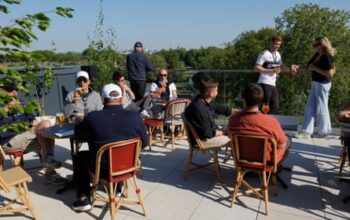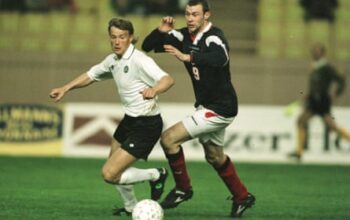It is a spectacle increasingly common in Premier League technical areas. Whenever a free-kick or corner is awarded, managers are joined by another figure who wildly gesticulates and shouts instructions at his team’s players for a few seconds before taking his seat again in the dugout.
Thanks largely to the exploits of Arsenal’s Nicolas Jover, the set-piece coach’s stock has never been higher. Two goals from corners in last weekend’s north London derby mean Mikel Arteta’s side have equalled the Premier League record of 16 set by West Brom in 2016-17, managed by a certain Tony Pulis, and have 22 in total from set pieces – four more than their nearest rivals, Everton. Arsenal have also conceded only six, second to Manchester City (two), where Jover was replaced by Carlos Vicens in 2021.
Arsenal and City are by no means the only top-flight clubs turning to the specialists. Aston Villa’s long-haired Austin MacPhee matched Jover in the exuberance stakes in the technical area in his side’s 2-0 win at the Emirates in April and doubles as an assistant for Scotland’s men’s team; Nottingham Forest hired the former England Under-19s coach Simon Rusk in December to resolve their significant set-piece issues; and Chelsea have poached Bernardo Cueva from trendsetters Brentford to head up their new set-piece department from next season.
“I think there will be more and more in the future,” says the former Aston Villa manager Dean Smith, who gave Jover his first opportunity in English football at Brentford in 2016 and is in charge of the MLS side Charlotte. “Clubs are starting to take much more notice of set pieces now but it’s very hard to coach so it’s about getting the right person in and giving the players that belief.”
Arsenal had scored only five goals from set pieces in the season before Jover’s arrival, the third-lowest in the league. The transformation has been spectacular since Arteta recommended recruiting him when Jover’s contract was not renewed after two seasons at City.
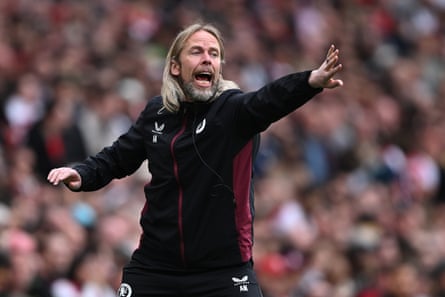
“I still speak to him regularly so I’m pleased to see he’s doing so well,” says Smith, who attempted to persuade Jover to join him at Villa Park. “He went to Man City and he really enjoyed it but was probably restricted in the amount of input he was getting because of the way Pep Guardiola coaches. But he’s certainly found himself at Arsenal.”
Brentford had tested the waters in 2015 by hiring the fabled Italian set-piece coach Gianni Vio, a former banker who is at Watford having worked at Spurs under Antonio Conte last season. But Smith remembers being immediately impressed with Jover, who had worked as a video analyst for Montpellier and Croatia but was looking for an opportunity to concentrate on set pieces.
“I really liked what I saw and heard in our interview,” Smith says. “He had such a good personality and the way he presented everything to the players helped them to buy into what he wanted very quickly. They all liked him and wanted to do things for him. Set-piece training is still probably one of the hardest things to coach because it’s the least favourable thing for players to do. They want to be playing small-sided games and finishing, not standing around for ages. You have to get a buy-in from them but Nico did that straight away.”
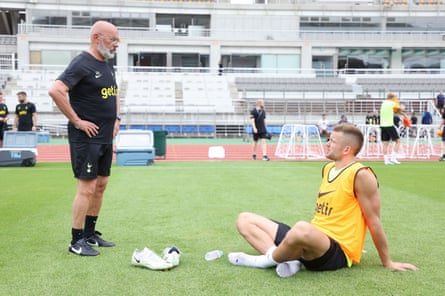
Brentford scored 46 set-piece goals in his three seasons before he was snapped up by City, with Arteta said to have been instrumental in his move to the Etihad after inviting him to his villa in Mallorca. After helping Guardiola’s side to successive titles, Jover was reunited with Arteta when he replaced Andreas Georgson at the Emirates.
One of the Frenchman’s most striking innovations this season has been Arsenal’s reliance on inswinging corners, which comprise all but one of the 199 they have delivered into the penalty area. According to Smith, Jover’s appearances in the technical area are also a more recent innovation.
after newsletter promotion
“Nico’s grown into that role because he was always sitting in the stands at Brentford,” he says. “It could be a small difference that you could communicate from the sideline if there’s something that you’ve seen that might make the set piece not work and you have to adjust it. But if you’ve worked on things for the previous week then the players should know what is coming anyway.”
Not all Premier League managers seem to have bought into the trend, however. Chelsea’s Mauricio Pochettino has been dismissive about the importance of a specialist despite his club’s decision to hire Cueva, a Mexican who has worked with Norway. And Ange Postecoglou doubled down this week on his conviction that “there are far more important things that we need to concentrate on” than set plays, even though Tottenham have conceded nine goals from corners (including six in their past 10 matches) and 16 times from set pieces in total, the latest two at Chelsea on Thursday.
Perhaps he should be paying greater attention to an area that can often amount to 30% of all goals scored in a season. Spurs have managed 11 so far, meaning they are minus-five for the season compared with Arsenal’s plus-16 – a 21-goal difference between the two sides. Mile Jedinak, the former Australia midfielder who was captain of Villa under Smith when they won promotion from the Championship in 2019, has been in charge of defensive free-kicks at Tottenham this season after taking over from Cristian Stellini and usually sits in the stands during matches.
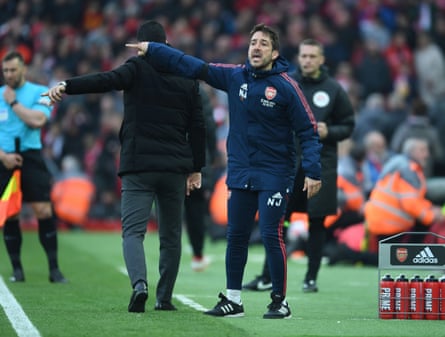
The former Tottenham interim manager Ryan Mason assumed responsibility last summer for attacking drills from Vio, who also worked with the Italy side that won Euro 2020 and is said to have almost 5,000 corner routines. Neither has had a positive impact. Tottenham have conceded four more than the total from last season and two more than in the previous campaign, and have scored five fewer.
“They are so important and that’s because so many games can be settled by a set-piece goal,” says Smith. “Nico does a lot of analytical work off the pitch for each game and tries to tailor the approach for every opponent. It’s about trying to identify weaknesses in the way teams defend and exploiting them. I’d say he definitely deserves a medal if they win the league.”
Source: theguardian.com

